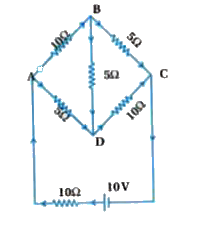A parallel plate capacitor is filled by a dielectric whose relative permittivity varies with the applied voltage (U ) as ε=α U whereα=2V−1. A similar capacitor with no dielectric is charged to U0 = 78 V. lt is then connected to the uncharged capacitor with the dielectric. Find the final voltage on the capacitors. Solution in Gujrati
Let the capacitance of capacitor without dielectric is C and hence, charge on capacitor
Q1=CU
where U is the final potential of a capacitor
As the capacitor with dielectric having relative permittivity ε and its capacitance ∈ C. Hence, charge on the capacitor is,
Q2=∈CU=aU×CU=aCU2
[∵∈=aU]
The initial charge on the capacitor is,
Q0=CU0
From the conservation of charge,
Q0=Q1+Q2
CU0=CU+aCU2
∴aU2+U−U0=0
Now a = 2V−1 and U0 = 78 V
∴2U2+U−78=0
is a binomial equation of U.
∴2U2+13U−12U−78=0
∴U(2U+13)−6(2U+13)=0
∴(2U+13) (U-6) =0
∴U=−132orU=6
∴U=−132 is impossible
∴U=6V final voltage
Topper's Solved these Questions
- BOOK - KUMAR PRAKASHANCHAPTER - ELECTROSTATIC POTENTIAL AND CAPACITANCEEXERCISE - Section D ( Multiple Choice Questions (MCQs) )93videos
ELECTROSTATIC POTENTIAL AND CAPACITANCE
- BOOK - KUMAR PRAKASHANCHAPTER - ELECTROSTATIC POTENTIAL AND CAPACITANCEEXERCISE - Section D ( MCQs asked in Cometitive Exams )39videos
ELECTROSTATIC POTENTIAL AND CAPACITANCE
- BOOK - KUMAR PRAKASHANCHAPTER - ELECTROSTATIC POTENTIAL AND CAPACITANCEEXERCISE - Section C ( NCERT Exemplar Solution ) (Short ,Aswer Type Questions )5videos
ELECTROSTATIC POTENTIAL AND CAPACITANCE
- BOOK - KUMAR PRAKASHANCHAPTER - ELECTROMAGNETIC WAVESEXERCISE - BOARD.S QUESTION PAPER MARCH - 2020 (PART - B) SECTION - C5videos
ELECTROMAGNETIC WAVES
- BOOK - KUMAR PRAKASHANCHAPTER - MAGNETISM AND MATTEREXERCISE - SECTION D Multiple Choice Questions (MCQs) (MCQs asked in Competitive Exams) MCQs asked in Board Exam and GUJCET7videos
MAGNETISM AND MATTER
Similar Questions
When a unit positive charge moves from one point to another point in an electric field, work done on it ......
05:21View SolutionCapacitance of a capacitor 100 μ F. The work is done for depositing chargc 8×10−18 C on it will be .........
05:48View SolutionProve that a closed equipotential surface with no charge within ilself must enclose an equipotential volume.
04:48View SolutionDetermine the current in each branch of the given network.
 View Solution
View SolutionAt a place on earth the vertical component of earth's magnetic field is √3 times its horizontal component. The angle of dip at this place is …...
11:00View SolutionThe plates of a parallel plate capacitor with no dielectirc are connected to a volatage source. Now a dielectric of dielectric constant K is inserted to fill the whose space between the plates with voltage source remainign connected to the capacitor-
07:06View SolutionA parallel palte capacitor is filled by a dielectric whose relative permittively varies with the applied voltage (U) as ε=αU where alpha =2V−1. A similar capacitor with no dielectric is charged to U0=78V. It is then is connected to the uncharged capacitor with the dielectric. Find the final voltage on the capacitors.
08:33View Solutionparallel plate capacitor is filled by a dielectric whose dielectric constant varies with the applies voltage (V) as K = 2V. A similar capacitor with no dielectric is charged to V0=78 volt.It is then connected to the uncharged capacitor with the dielectric.Find the final voltage on the capacitors
View SolutionA parallel plate capacitor A is filled with a dielectric whose dielectric constant varies with applied voltage as K = V. An identical capacitor B of capacitance C0 with air as dielectric is connected to voltage source V0=30V and then connected to the first capacitor after disconnecting the voltage source. The charge and voltage on capacitor.
View Solutionसमान्तर प्लेट संधारित्र की दोनों प्लेटों के बीच की जगह को एक परावैद्युत पदार्थ की प्लेट से पूरी तरह भर दिया जाता है। संधारित्र को आवेशित कर बैटरी से हटा लिया जाता है। इस परावैद्युत प्लेट को अब धीरे-धीरे संधारित्र के बाहर प्लेटों के समान्तर खींचा जाता है। इस तरह बाहर खींचे गये परावैद्युत प्लेट की लम्बाई x तथा संधारित्र की प्लेटों के विभवान्तर V के बीच खाचा गया ग्राफ होगा :
View Solutionएक समानान्तर प्लेट संधारित्र को ऐसे परावैद्युत से भरा जाता है जिसकी आपेक्षिक विद्युतशीलता लगाये गये वोल्टता (V) जैसे ε=αV जहाँ α=2V−1 के साथ परिवर्तित होती है। एक बिना परावैद्युत वाले समरूप संधारित्र को V0 =78 V से आवेशित किया जाता है। इसे फिर परावैद्युत वाले अनावेशित संधारित्र से जोडा जाता है। संधारित्र पर अंतिम वोल्टता क्या होगी?
04:43View SolutionA parallel plate capacitor is filled by a dielectric whose relative permittivity varies with the applied voltage (U) as ε=αU where alpha =2V−1. A similar capacitor with no dielectric is charged to U0=78V. It is then is connected to the uncharged capacitor with the dielectric. Find the final voltage on the capacitors.
07:06View SolutionA parallel plate capacitor A is filled with a dielectric whose dielectric constant varies with applied voltage as K = V. An identical capacitor B of capacitance C0 with air as dielectric is connected to voltage source V0=30V and then connected to the first capacitor after disconnecting the voltage source. The charge and voltage on capacitor.
05:19View SolutionA parallel plate capacitor is filled by a dielectric whose permittivity varies with the applied voltage according to the law ε=αU . where α=1V−1 . The same (but containing no dielectric) capacitor charge to a voltage U0=156V is connected in parallel to the first ..nonlinear.. uncharged capacitor Determine the final voltage U across the capacitors (nearly).
01:02View SolutionThe plates of a parallel plate capacitor with no dielectric are connected to a voltage source. Now a dielectric of dielectric constant K is inserted to fill the whole space between the plates with voltage source remaining connected to the capacitor.
02:19View Solution
